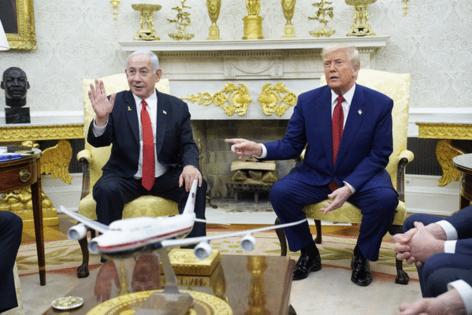Trump casts Netanyahu adrift with shifts on Iran, Houthis, Gaza
Published in News & Features
TEL AVIV, Israel — Israeli Prime Minister Benjamin Netanyahu would normally celebrate a hostage release such as that taking place on Monday, though in this case the deal with Hamas is another sign U.S. President Donald Trump is starting to make decisions without him.
The freeing of Edan Alexander, the last living U.S. citizen held captive by Hamas in Gaza, was presented by the Palestinian militant group as a gesture to Trump on the eve of his trip to the Middle East, where he will visit Saudi Arabia, Qatar and the United Arab Emirates but not Jerusalem.
The isolated release — which Israel objected to when it was first proposed two months ago — follows the start of negotiations between the U.S. and Iran about a new nuclear deal, a ceasefire with Yemen’s Houthis and Washington’s imposition of tariffs on Israel — all at odds with Netanyahu’s wishes.
“When the Israeli right was jubilant over Trump’s election, I warned ‘not so fast,’” said Michael Oren, a former Netanyahu ambassador to Washington. “But what is going on is even beyond what I feared. Donald Trump is a crisis for the world. We thought we’d be treated differently. We were wrong.”
Netanyahu on Sunday sought to reassure his country that his “relationship is excellent” with Trump.
“We are currently blessed with a president and an administration that is very, very friendly,” he said in a video clip. “We’re trying to coordinate both the big things as well as the small things.”
During his first term through 2021, Trump moved the U.S. embassy to Jerusalem, recognized Israeli sovereignty over the Golan Heights captured from Syria and helped Israel establish relations with four Arab states including the United Arab Emirates. The U.S. leader also withdrew from an Iranian nuclear deal that Israel disliked.
Far-right Israeli politicians were therefore jubilant when he won a return in last year’s election, saying Trump was so favorable to their agenda that the country would soon declare sovereignty over the West Bank, where 3 million Palestinians live under occupation.
Trump initially appeared to prove them right, reinstating arms deliveries withheld by predecessor Joe Biden’s administration out of concern over civilian casualties in Gaza.
Netanyahu was then the first foreign leader hosted by Trump in the Oval Office in February, and even he seemed stunned by the new president’s suggestion that Gaza’s 2 million-strong population be moved abroad to make way for postwar reconstruction.
“You are the greatest friend Israel has ever had in the White House,” Netanyahu said to the president at the time.
The first inkling of discord came in April when Trump announced a 17% tariff on Israeli goods, granting the country no exemption from the penalties imposed on scores of other countries. Netanyahu was quick to raise the issue, pledging to end Israeli duties on U.S. goods in return for the same deal from the US.
Netanyahu was granted another Oval Office meeting, but this one was less of a love-in. Trump said the U.S. was generous with Israel, providing it with billions of dollars a year in aid, and a tariff break would be a step too far. That day, he announced talks with Iran over its atomic activities.
“This U.S. administration, without a doubt, is one of the most favorable to Israel ever,” said opposition legislator Matan Kahana. “But predictably, the Americans first and foremost look after the Americans.”
The U.S. went on to agree to stop bombing the Yemen-based Houthis in exchange for their agreement not to fire on American ships. The Houthis started firing on vessels in the Red Sea — upending global trade — in solidarity with Hamas after the start of the war in Gaza in 2023, and haven’t agreed to stop attacking Israel despite the deal with Washington.
The Houthis — which like Hamas is backed by Iran and designated a terrorist organization by the U.S. — landed a missile close to Israel’s biggest airport earlier this month, prompting many foreign airlines to cancel flights.
‘Mr. America’
“Netanyahu presents himself as Mr. America — he and his aides thought they spoke Trumpism,” said Eytan Gilboa, a scholar of US-Israeli relations at Israel’s Bar Ilan and Reichmann Universities. “But the vocabulary in the White House has changed.”
That may in part be due to the ascendancy of U.S. isolationists like Vice President JD Vance.
Israelis on the right are watching with unease, while those on the center and left are feeling uncharacteristically hopeful. They oppose Netanyahu’s plan to extend the war in Gaza without first freeing hostages and are increasingly in favor of a diplomatic solution to the Palestinian dispute through an alliance with Saudi Arabia.
This means, Israeli analysts say, that if Trump does push Netanyahu to end the war in Gaza, a domestic political crisis will erupt. The PM needs his far-right allies to keep his coalition afloat.
“There will be demonstrations in the street whether Netanyahu accepts what Trump wants or rejects it,” said Oren, the former ambassador. If he accepts, his government will likely fall apart. If he rejects, the opposition will rise up.”
_____
(With assistance from Marissa Newman.)
_____
©2025 Bloomberg L.P. Visit bloomberg.com. Distributed by Tribune Content Agency, LLC.







Comments